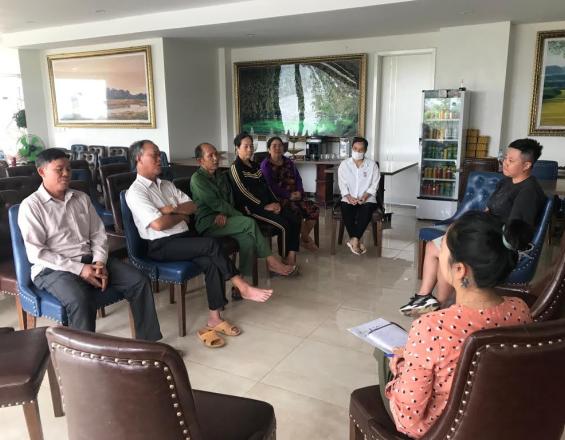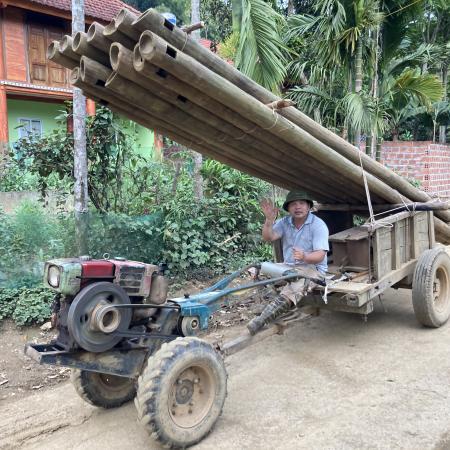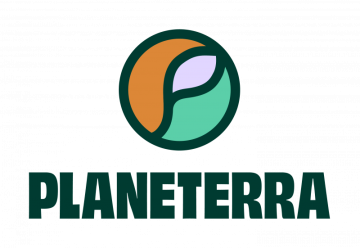
Community Task Force fostering community involvement in local tourism management

Community tourism can only prosper and be sustainable if it is driven by the people. Therefore, the ‘Sustainable Tourism and Protected Areas in a Post-COVID World’ project initially contemplated the option of bringing all stakeholders directly or indirectly involved in ecotourism in the selected PAs (including their management boards) together to achieve the common goal of creating sustainable ecotourism offers.
However, during the project implementation, it was noted that not all the stakeholders had the same levels of interest and support, therefore a new approach was suggested. This implied creating a “taskforce” with the key local stakeholders and instead of having network meetings, small workshops at the local level were organised to facilitate the visioning of tourism at the early stage.
The community workshops aimed to identify 1-2 representatives to form Tourism Task Forces, define the community’s vision for tourism and an action plan to carry out in 2023. Plans tend to differ from how situations evolve.
Context
Challenges addressed
-
Tourism in the selected PAs already exists but sustainable tourism practice is limited and there is no organisation for stakeholders to reach out for tour product development and promotion.
-
The Ecotourism Cluster Network initially introduced to the project was inspired by the Mediterranean Experience of Ecotourism Network’s (MEET) annual, which was specifically focused on developing ecotourism products that satisfy criteria in order for the Protected Area to become a part of MEET. However, tourism in the two selected PAs was not mature enough for all stakeholders to express the same levels of interest and support. The ECN did not succeed.
-
As the project only lasted one year, local people did not have a full understanding of tour products in their very communities and PAs. In addition, they did not have a joint working mechanism to coordinate the tour professionally. In case of information enquiries or booking, there is no focal contact point to coordinate with individual service providers.
Location
Process
Summary of the process
A strong sense of community and connectedness among its members is essential for an open and transparent discussion using participatory bottom-up approach for a Task Force to come into being.
Building Blocks
Participatory Bottom-up Approach
In order for the initiative to harness community members’ participation and reflect their opinions, it needs to start at the grassroots or village’s level by forming a “task force” consisting of key local ‘champions’. Instead of a meeting at the high level (with local authorities and PA management boards and only a few representatives from the villages), small workshops at the local level were organised to facilitate the visioning of tourism at the early stage. Once the community has a clear vision of how they want tourism to look within their village, they would have a direction to move forward. With this approach, having a Tourism Task Force at the community level is crucial to continue the sustainability and the momentum built during the project to enhance nature conservation and promote local well-being through tourism.
Enabling factors
Through the workshops, the following points have been discussed and determined:
-
Mobilising resource persons (key ‘champions’) in each village involving in the tourism development in each PA
-
Identifying a representative / coordinator of the Task Force
-
Clarifying the expected roles and responsibilities of the Tourism Task Force
-
Identifying the action plan with key actions to carry out for 2023
Lesson learned
The participatory approach encourages local members’ participation but it can also demotivate them in case there is one strong negative feedback. In this exercise, two workshops were organised, only one was considered successful. It was observed that during the ‘unsuccessful’ workshop, the voice of one Village Head was very strong, making other members hesitant with the initiative although they seemed supportive in the beginning. At the community where the successful workshop took place, people have the same level of understanding about tourism and are bonding over the joint benefits of their community.
Strong sense of community
A benefit sharing mechanism and the cooperation can only happen when the villagers have a strong sense of community and trust one another.
-
-
Tour operators and travel agencies tend to send guests to 1-2 particular homestays and/or using the same service providers to ensure the consistent service quality throughout all bookings. A task force allows its members to work together to improve the quality of homestay and other services for consistency in the delivery of services and products.
-
A local coordinator is needed in case of a tourism task force, for communication and for booking allocation among homestays. This coordinator must be trusted and transparently elected among the members. Together with booking allocation, a benefit sharing mechanism should also be deployed to make sure that the community also gets the indirect benefits from community tourism. For instance, a community fund takes 5-10% of revenue to support common affairs in the village.
-
Enabling factors
Cooperation at the grassroot level may only work without a formal structure when it is organised within a community with a strong connectedness among its members. The bonding among community members enables a trusted relationship and supportive environment. It also allows amicable settlements in case of disputes or conflicts. The local coordinator should also be trusted in the community as (s)he is perceived to inherently have an advantage of knowing the booking information first-hand and being able to assign the service providers.
Lesson learned
Despite the difference in the result of this activity, people in both PAs tend to be positive that it still contributes to the ongoing process of establishing community tourism. As pointed out throughout two workshops, the biggest concern of the local members is still the formality of such institutions, be it a network at the inter-regional level like Ecotourism Cluster Network or an association at the grassroots level like Community Task Force.
Impacts
Two task force workshops were organised with key local champions who pioneered joining tourism initiatives in the beginning phase (6 community members representing 3 villages in Van Long NR and 9 people from Khanh village of Cuc Phuong NP).
-
01 task force was successfully formed (or revived) in Khanh village with core members being 4 homestay owners and 1 tour guide coordinating new experiences
-
No task force was established in Van Long NR. Participants agreed that for the tourism activities to continue, a local operator can work directly with individual service providers.
Beneficiaries
The residents of 4 selected villages in and around Cuc Phuong National Park and Van Long Nature Reserve
Sustainable Development Goals
Story

❝This is a much needed thing [task force] for Khanh villagers to know how to work together and with tour agents when they come visit us. In the past, we only worked with the Cuc Phuong Management Board, and we had a small group mechanism. But during 2 years of COVID, no guests came. Therefore this group is no longer active. We also talked to Cuc Phuong Management Board and sought their agreement to let us host guests who do not come through the main gate. With the revision of this group and extension to new members*, we hope that we can work with other tourists coming from the Ho Chi Minh trail.❞
- Mr. Bui Van Dien (Muong ethnicity, Khanh villager, homestay owner)
* The old group consists of 4 homestay owners. Whenever there is a booking from Cuc Phuong Management Board, the homestay owner getting the booking must act as the coordinator of other services. There was no central booking / communication system.



